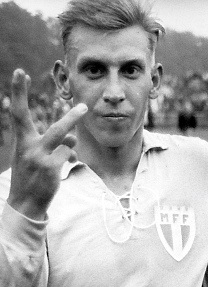Bo Larsson
Bo "Bosse" Larsson (born May 5, 1944 in Malmö ) is a former Swedish football player . The two-time Swedish Footballer of the Year , mainly used in midfield and attack, won the championship six times and the cup four times with Malmö FF between 1965 and 1978 . In 1978 he led the club into the final of the European Champion Clubs' Cup . "Bosse" Larsson is listed in the Allsvenskan with 307 league games and 124 goals and was three times the top scorer in the league. In his three years at VfB Stuttgart , he played 88 games in the Bundesliga from 1966 to 1969 and scored 21 goals. In the national team he played a total of 70 international matches from 1964 to 1978, scored 17 goals and took part in the three world championships in 1970 , 1974 and 1978 .
Career
Club career
Larsson made his debut for Malmö FF in 1962 in the Allsvenskan . In 1965 he was honored with the team of Swedish champions and for the first time Sweden's footballer of the year . He scored 28 goals in 22 league games in the championship year and was the top scorer with 17 goals as in 1963 .
A year later he moved to Germany for VfB Stuttgart in the Bundesliga . Although Horst Köppel and Karl-Heinz Handschuh, two other highly talented young players, were added to the Swabian licensed squad, VfB ended up in a disappointing 12th place in 1966/67. The result was that coach Rudi Gutendorf was replaced by former national player Albert Sing on December 14, 1966 . In Larsson's second season, Stuttgart under the new coach Gunther Baumann improved to 8th place, in the third season 1968/69 to 5th place, with the man from Malmö scoring nine goals in 33 league games. The Swede was perceived as extremely reliable, largely inconspicuous and humanly as a great asset to Stuttgart. When he left, VfB boss Dr. Walter afterwards sadly: “A bitter loss. Bo was our most valuable player. ”Larsson said goodbye to the Bundesliga with the winning goal to make it 4: 3 in the home game on June 7, 1969 against 1. FC Kaiserslautern. His wife had not been able to acclimatise in Germany. In total, the offensive player played 88 Bundesliga games in three years, in which he scored 21 times.
In 1969, Larsson returned to Malmö FF and had successes in series over the next few years. He was five more times champion (1970, 1971, 1974, 1975, 1977) and four times cup winner (1973, 1974, 1975, 1978). In 1970 he won the championship with 16 goals and the top scorer's crown, in 1973 he was again Sweden's footballer of the year and was the first to receive the guldbollen a second time. In 1978 he led the team trained by the Englishman Bob Houghton to the final of the European Cup, which, however, was lost 1-0 to Nottingham Forest in the Munich Olympic Stadium . Larsson was unable to take part here due to an injury
In 1980 he was still playing at Trelleborgs FF . He subsequently lived in Malmö and worked at Skanska , one of the largest construction companies in the world , until he retired . In 2005 he was accepted by the Association of Swedish Football Historians and Statisticians as the 18th member of their Hall of Fame . At the opening of the new Malmö stadium in 2009, he carried out the kick-off together with the then Malmö FF captain Daniel Andersson .
National team
Larsson made his debut at the age of 20 on September 20, 1964 in Oslo in the international match against Norway for Sweden . At 1-1, he distinguished himself as a goalscorer on his debut. The versatile player completed a total of 70 international matches in which he scored 17 goals. He participated in the world championships in 1970 , 1974 and 1978 . At the 1974 World Cup in the Federal Republic of Germany, he and his team reached second place in the group - Sweden had wrested a 0-0 from the Netherlands - and was eliminated in the final round after two defeats against Poland (0-1) and the DFB selection 2: 4 out of the tournament. In the playoff in the qualification on November 27, 1973 in Gelsenkirchen against Austria, he scored a goal for a 2-1 success. With the group game on June 11, 1978 in Buenos Aires against Spain (0-1) at the World Cup in Argentina, he ended his national team career. In addition to fellow players like Ronnie Hellström , Hasse Borg , Björn Nordqvist , Ingemar Erlandsson , Torbjörn Nilsson , Thomas Sjöberg , Ralf Edström and Benny Wendt , he said goodbye to the national team.
Achievements and Awards
- Swedish champions: 1965, 1970, 1971, 1974, 1975 and 1977
- Swedish Cup Winner: 1973, 1974, 1975 and 1978
- Swedish top scorer: 1963 (17 goals), 1965 (28) and 1970 (16)
- Guldbollen: 1965, 1973
literature
- Christian Karn, Reinhard Rehberg: Player Lexicon 1963–1994. Agon Sportverlag. Kassel 2012. ISBN 978-3-89784-214-4 . P. 297.
- Michael Horn: Lexicon of international soccer stars. Publishing house Die Werkstatt. Göttingen 2004. ISBN 3-89533-466-9 . P. 140.
- Hardy Greens: With the ring on your chest. The history of VfB Stuttgart. Publishing house Die Werkstatt. Göttingen 2007. ISBN 978-3-89533-593-8 . P. 115.
Web link
- Bo Larsson in the database of weltfussball.de
- Bo Larsson in the database of fussballdaten.de
Individual evidence
| personal data | |
|---|---|
| SURNAME | Larsson, Bo |
| ALTERNATIVE NAMES | Larsson, Bosse (nickname) |
| BRIEF DESCRIPTION | Swedish soccer player |
| DATE OF BIRTH | May 5, 1944 |
| PLACE OF BIRTH | Malmo |

